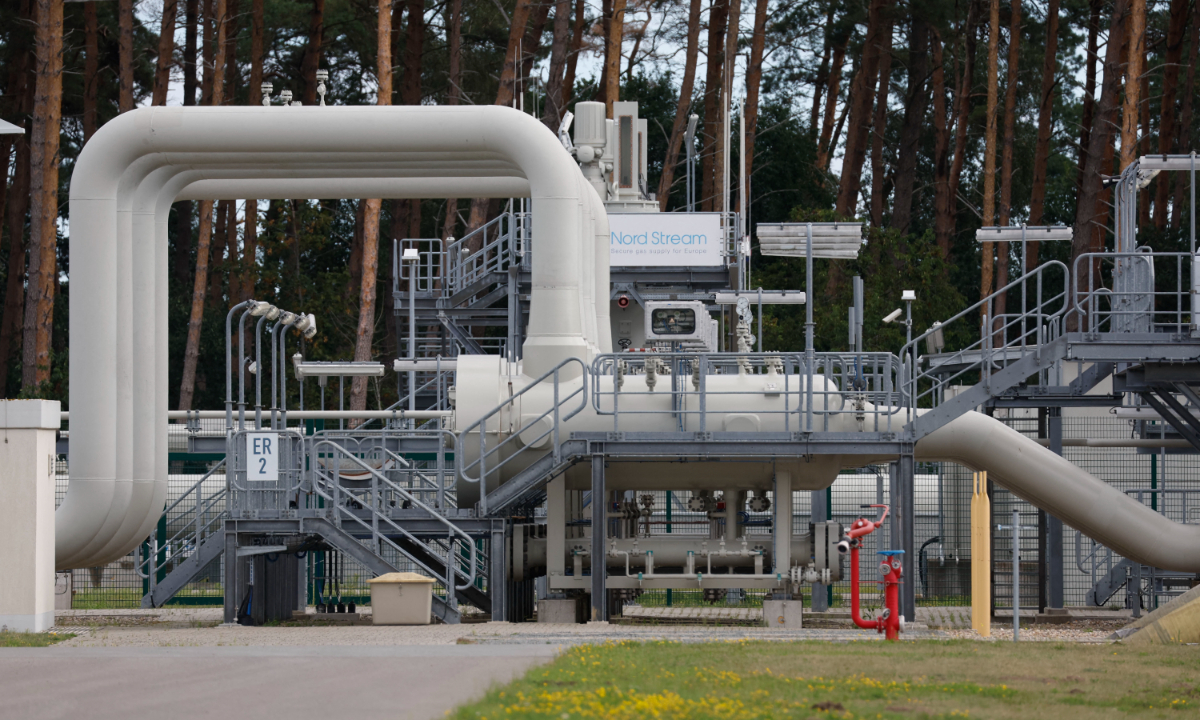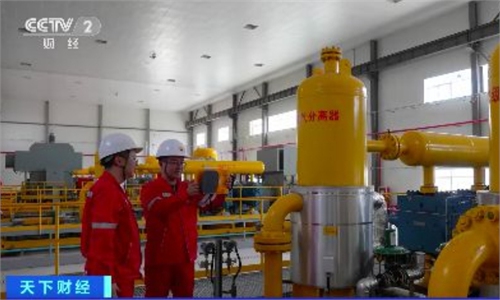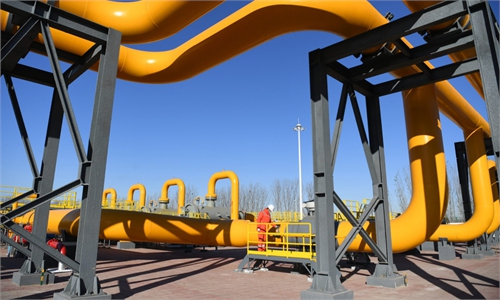Fears of energy, economic crises in Europe grow, as Russia keeps pipeline shut
Continent faces energy, economic crises as gas flow halted

Nord Stream 1 pipeline Photo: AFP
As Russian energy giant Gazprom kept one of its main gas pipelines to Europe shut on Saturday, fears over a looming energy crisis as well as a potential economic recession in Europe have further intensified, with Chinese experts pointing out that the continent is bearing the brunt of the US-led Western economic war against Russia.Gazprom on Saturday cancelled the resumption of gas flows through the Nord Stream 1 pipeline, citing an oil leak in a turbine, Reuters reported. European countries had been expecting the pipeline to resume flows, as they struggled to control surging gas prices, according to the report.
The latest development caught global attention, as many raised concerns about a looming energy crisis in Europe during the upcoming winter, which could further ex-acerbate expanding economic woes in one of the world's largest economic blocs.
A Wall Street Journal report said that Europeans fear a "long, cold" winter if Russia presses the pause button on their natural gas supply. A CNBC report said that the gas crisis is "shaking Europe's economic prospects." What's worse is that gas shortages across Europe could last for several winters, according to some media reports.
Although the EU has been actively seeking a replacement for Russian gas, it cannot replace it entirely and solve the European energy crisis fundamentally, due to limited liquefied natural gas (LNG) for sale and lack of import terminals in Europe, Chen Jia, an independent research fellow on international strategy, told the Global Times on Sunday.
"Once Russia shuts down supplies completely, even if the EU tries to find replace-ment from countries like the UK and Norway, it would still leave the gap at roughly 130 million cubic meters a day," Chen said.
According to Chen, the EU's overseas transport capacity has reached its limit, while its own energy storage plan cannot completely make up for the gas supply gap.
Hong Tao, a professor with the Beijing Technology and Business University, also told the Global Times on Sunday that if the suspension of Nord Stream 1 lasts, it will un-doubtedly lead to a "fatal energy crisis" in Europe.
"Because of moves such as cutting gas imports from Russia and implementing a price cap on global purchases of Russian oil, Europe's efforts in reserving oil and natural gas will not ultimately solve the serious energy problem as the embargos and price caps go against market rules, which will only make its energy shortage worse," Hong said.
Further cuts of Russian energy exports to Europe are also expected to exacerbate the EU's economic situation by bringing about problems like further rises in commodity prices, difficulties in companies' production, and higher costs for companies, analysts said.
The fluctuation in Russia's energy supplies have already driven up European gas prices to a considerable level. According to data in a CNBC report, gas prices in Europe have been hiked by about five times between August 2021 and this June.
The European Commission projected earlier that the EU economy would grow at 2.7 percent this year and 1.5 percent next year, but a full shutdown in gas supplies from Russia could bring about a recession later in 2022, it estimated, according to the re-port.
Meanwhile, analysts said that the US has played an active role in flaring up the dis-pute between Europe and Russia for its own interests, as US companies have benefit-ed greatly from the EU's struggle to find alternative energy supplies.
"As it turns out, the US has gained the most from the energy crisis by opening up a huge market for American gas suppliers, tightening its grip on Europe and hurting Russia's key export," a Beijing-based expert on international affairs who spoke on condition of anonymity told the Global Times.
As of June, the US exported about 57 billion cubic meters of LNG, with 39 bcm, or 68 percent, going to Europe, according to Refinitiv data. That is compared with 34 bcm, or 35 percent, of LNG exports shipped to Europe during 2021, when US LNG exports totaled around 97 bcm, according to Reuters.
Chen said that the side effects of Europe's decision to follow the US footsteps are growing rapidly, as it not only caused the living quality of people in the EU to plum-met, but also disrupted global energy, bulk commodity and financial markets.



